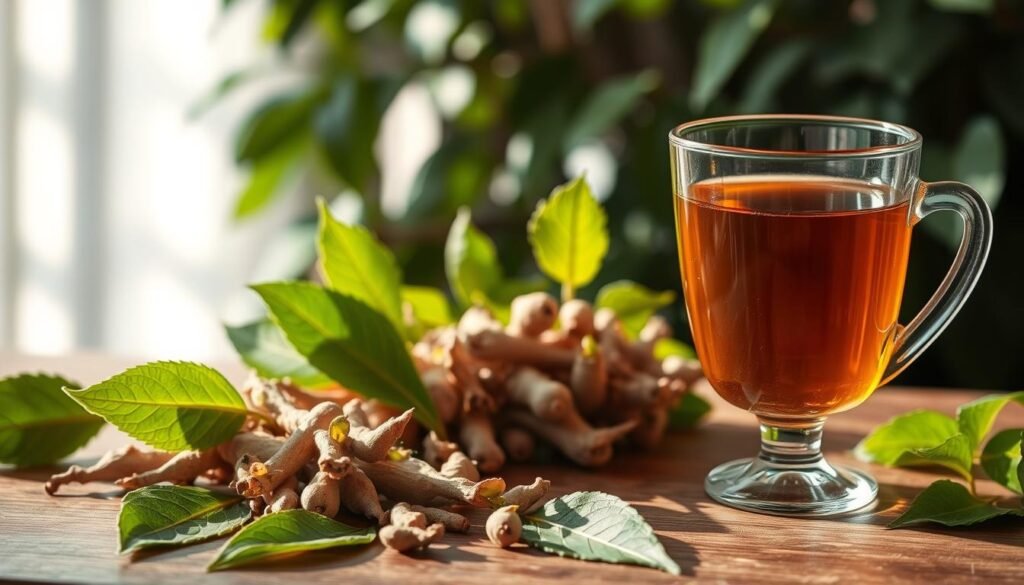Did you know ashwagandha’s use goes back over 3,000 years in ancient Indian writings? This special herb, known scientifically as Withania somnifera, is famous for reducing stress and anxiety. Studies suggest it can start improving sleep in just 30 days. This article will look into how long it takes for ashwagandha to ease anxiety. We’ll cover its dosage, benefits, and what users think about its effectiveness for anxiety symptoms.
Key Takeaways
- Ashwagandha has been used for over 3,000 years in traditional medicine.
- Initial effects may appear within the first 30 days for improved sleep.
- Users may notice a reduction in stress and anxiety within a few days to a couple of weeks.
- Long-term use beyond several months is often needed for full adaptogenic benefits.
- Recommended starting dosages can be as low as 300 to 500 mg per day.
Introduction to Ashwagandha
Ashwagandha, or Withania somnifera, is an evergreen shrub found in warm places. It’s also known as Indian ginseng or winter cherry. Its roots and leaves are used for health benefits. Ashwagandha helps with anxiety, making it easier to handle stress.
It’s known as an adaptogen. This means ashwagandha can help your body fight stress better. This makes you feel mentally stronger. The herb is famous for its ashwagandha benefits for anxiety. Many studies have shown it can lower stress levels.
Ashwagandha doesn’t just reduce stress. It can also improve your sleep and make your brain work better. Because of these benefits, it’s becoming more popular for those interested in natural health.
Ashwagandha and Its Role in Anxiety Relief
Ashwagandha is a powerful natural remedy known for its role in easing anxiety. Studies show its effectiveness, highlighting ashwagandha effectiveness for anxiety. People usually feel better after 2 to 4 weeks of regular use. Some see improvements in just one week; others may take up to 6 weeks. It’s important to take it consistently for the best results.
The form of ashwagandha you take matters. Capsules and powders work faster and stronger than teas. Start with a low dose to see how you react, then adjust if needed. Always talk to a doctor if you’re taking other supplements to make sure they mix well.
Ashwagandha works by affecting biochemical pathways that reduce anxiety. Studies with its root extract show big decreases in stress. Withanolides and sitoindosides in it are anti-inflammatory and protect nerves. They also help manage stress with their antioxidant properties.
Ashwagandha helps manage crucial brain chemicals related to anxiety and mood. It’s been used in traditional medicine for centuries. This shows its long-standing value in health practices.
People continue to turn to ashwagandha for its possible anxiety relief. Its benefits are supported by science and personal experiences alike.
How Long Does Ashwagandha Take to Work for Anxiety
The journey to feeling the calming effects of ashwagandha is quite interesting. Many people ask how long does ashwagandha take to work for anxiety. You might start to see benefits like less stress and better sleep in days to weeks. But, significant changes often take a bit longer.
Understanding the Typical Timeline
Consistent use of ashwagandha may reduce anxiety after four to eight weeks. This is what many studies suggest. Clinical trials have shown positive changes in anxiety scores, usually in this timeframe. For example, using ashwagandha daily could improve sleep quality by 66% in thirty days. Effects on cognitive function may take longer to notice.
Varied Results Across Individuals
It’s important to understand that everyone’s experience with ashwagandha is different. Dosage, body chemistry, and health can affect how quickly you see results. Some people notice quick improvements, but for others, it might take months. Knowing this helps manage expectations and figure out how ashwagandha could help you. For further insights, you might want to check out this detailed resource.
| Timeline | Effects | Comments |
|---|---|---|
| 1-2 Weeks | Reduction in stress and anxiety | Many experience initial calming effects of ashwagandha. |
| 3-4 Weeks | Improved sleep quality | Significant results in sleep improvements noted. |
| 4-8 Weeks | Cognitive function improvements | Enhanced mental clarity recognized over time. |
| 2+ Months | Long-term adaptogenic benefits | Full manifestation of cumulative effects may require ongoing use. |
Ashwagandha Dosage for Anxiety
Ashwagandha works well as a natural anxiety remedy if taken in the right amount. Finding the proper dose helps maximize benefits and limit side effects. It’s key to know the recommended amounts and adjust based on personal needs.
Recommended Dosages for Optimal Results
A good ashwagandha dosage for anxiety is between 300 mg and 600 mg daily. This range helps users feel less anxious. For best results, one should take it for at least a month. A dose of 500 to 600 mg per day for two months may reduce stress hormones, sharpen focus, and better sleep.
Adjusting Dosages Based on Individual Needs
Dosage adjustments may be necessary depending on health and anxiety levels. Starting with a 250 mg dose can effectively ease stress and anxiety for some. A healthcare provider can guide on adjusting the dose. Consistent use, in capsule or powder form, ensures its benefits.
| Form of Ashwagandha | Recommended Dosage |
|---|---|
| Powdered | 300-500 mg per day |
| Capsules | 300-600 mg per capsule |
| Standardized Extract (e.g., KSM-66®) | 125-600 mg per day |
For personalized advice, it’s best to consult healthcare professionals. To use ashwagandha for anxiety, factor in your health journey. Look into reliable dosing guides for more guidance.

Ashwagandha Effectiveness for Anxiety
More and more studies show ashwagandha works well for anxiety. Researchers have found this herb can greatly lower anxiety symptoms. People who take ashwagandha often feel much better, highlighting its value in managing anxiety.
Clinical Trials and Research Findings
Various studies have shown ashwagandha’s power to calm anxiety. It works by reducing stress hormones in our body. Some users feel less anxious and stressed within days to weeks of starting it. This quick effect makes ashwagandha a great choice for fast relief.
Phytochemical Composition and Its Impact on Effectiveness
Ashwagandha’s withanolides play a key role in fighting anxiety. These chemicals help control stress responses and balance stress hormones. For those facing a lot of stress and anxiety, ashwagandha can help stabilize your mood. Experts suggest using it regularly for the best results, emphasizing steady use for noticeable benefits.
Exploring Ashwagandha Benefits for Anxiety
Ashwagandha is a strong adaptogen known for helping with anxiety. It has been used in traditional medicine for over 3,000 years. Its key benefits include lowering stress and enhancing brain function. This makes it a great choice for those wanting natural ways to find mental clarity and emotional steadiness.
Reduction in Stress and Cortisol Levels
Studies have found ashwagandha can lower cortisol levels, which are linked to stress. This herb helps people deal with stress better. Many notice they feel less stressed after taking it regularly for a short time. Its adaptogenic effects improve wellbeing and help manage emotions, showing promise for treating anxiety naturally.
Improvement in Sleep Quality and Mental Clarity
Ashwagandha also helps people sleep better. Users often see a change in their sleeping habits within the first month. Better sleep leads to clearer thinking and better brain function, usually seen in 4 to 8 weeks. This herb not only helps with sleep but also with focusing and multitasking, easing anxiety signs and boosting mental health.

| Benefit | Effectiveness Timeline |
|---|---|
| Reduction in Cortisol Levels | Days to Weeks |
| Improvement in Sleep Quality | Up to 30 Days |
| Enhancement in Cognitive Function | 4 to 8 Weeks |
Natural Anxiety Remedy: Ashwagandha vs Other Supplements
Ashwagandha is a top choice for natural anxiety relief. Its special adaptogenic traits make it different from herbs like valerian root and chamomile. While these herbs help a bit, ashwagandha tackles stress in a more complete way. This can make you feel better overall.
Studies show ashwagandha really does help lower anxiety and stress. A big review of studies found it improves sleep and brain function. Compared to other supplements, ashwagandha has a wider impact on mental health.
To give a clear comparison, here’s how ashwagandha stacks up against other natural remedies:
| Natural Remedy | Benefits | Dosage Range | Unique Features |
|---|---|---|---|
| Ashwagandha | Reduces anxiety and stress, improves sleep quality and cognitive function | 120 mg to 600 mg daily | Adaptogenic properties, significant improvements in study participants |
| Valerian Root | Promotes relaxation and better sleep | 300 mg to 600 mg daily | Traditional sedative effects but may not address anxiety directly |
| Chamomile | Calming effects, helpful for sleep | 400 mg to 1600 mg daily | May take longer to have an effect compared to ashwagandha |
If you’re looking for a natural way to fight anxiety, ashwagandha might be your best bet. Its unique adaptogenic properties and proven results make it stand out. Choosing the right approach to anxiety management can really improve your health.
Ashwagandha Reviews for Anxiety
More and more people are trying ashwagandha to ease anxiety. Ashwagandha reviews for anxiety are mostly good. Users often feel less anxious after using ashwagandha regularly. It usually shows results in about 8 weeks according to their stories.
User Feedback and Experiences
People who take ashwagandha often talk about their results online and in reviews. They mostly say they feel better emotionally and less stressed. Many noticed changes when taking around 600 mg daily. They stress the need for taking it regularly. Users also note ashwagandha makes them feel calmer and improves their mood over time.
Comparative Analysis of Supplement Types
When looking at ashwagandha versus other herbs like chamomile or valerian root for anxiety, views differ. Ashwagandha is known for its adaptogenic qualities. But, feedback suggests the form and dose of the supplement play a big role in its effectiveness. Talking to a healthcare provider about mixing these supplements can lead to better results.
| Supplement Type | User Ratings | Key Benefits |
|---|---|---|
| Ashwagandha | 4.5/5 | Stress reduction, improved sleep, anxiety relief |
| Chamomile | 4.2/5 | Calming effects, sleep aid |
| Valerian Root | 4.0/5 | Sleep induction, anxiety management |
Ashwagandha for Stress and Anxiety: A Holistic Perspective
Ashwagandha has been vital in Ayurvedic medicine for over 3,000 years. It helps manage ashwagandha for stress and anxiety by lowering cortisol. This stress hormone is what our bodies make more of when we’re anxious. Modern studies show that ashwagandha can calm anxiety symptoms in people.
People often feel better after starting ashwagandha. Some see changes in days or a few weeks. Better sleep, which helps mental health a lot, can happen in the first month. But, some might need up to eight weeks to really feel less anxious.
Lifestyle changes can make ashwagandha work better for stress and anxiety. Mindfulness, exercise, and eating well help its adaptogenic effects. Adding supplements like magnesium can also help because they work on GABA receptors. The full benefits might take months to show, so keep taking it every day for the best results.
Your personal health will influence how much ashwagandha you should take. It works by affecting GABA signaling and our hormones. As research grows, so does our understanding of its power against anxiety. This knowledge guides us toward a holistic way of improving mental health.
Best Ashwagandha Supplement for Anxiety
Finding the right ashwagandha supplement can change how you manage anxiety. Many options are available, making it important to pick wisely. Look for products that contain at least 5% withanolides. This ensures they are effective.
Market Options and Recommendations
Several brands are noticeable for their quality.
- KSM-66: It stands out with a high withanolide content. It’s known for effectively reducing anxiety.
- Sensoril: Offers a potent mix for stress relief. It has a balanced blend of high withanolide levels.
- WeightWorld High Strength Ashwagandha: Hits the sweet spot of affordability and quality. It is a go-to for many users, providing a six-month supply.
- Zooki Ashwagandha Liquid Sachets: Comes with 100mg of curcumin per sachet. It’s for those looking for extra benefits alongside stress reduction.
Consider the dosage, which is often about 500 mg twice a day. This dosage helps with anxiety and keeps cortisol levels in check. Be aware of possible mild side effects, like upset stomach.
| Brand | Formulation | Price Range | Daily Dosage | Star Rating |
|---|---|---|---|---|
| KSM-66 | Capsule | £6.99 – £34.99 | 500 – 1500 mg | 4.5/5 |
| Sensoril | Capsule | £6.99 – £30.00 | 500 mg | 4.8/5 |
| WeightWorld High Strength | Capsule | £19.99 | 600 mg per serving | 5/5 |
| Zooki Ashwagandha | Liquid | £25.99 | 500 mg | 4.7/5 |
To choose the best ashwagandha for anxiety, think about what you need, possible side effects, and the quality of the product. Each option has something special. They meet various needs and lifestyles.

Conclusion
Ashwagandha is gaining attention as a natural way to reduce anxiety. It usually takes about 8 to 12 weeks to notice big changes. Yet, some people feel its positive effects – like lower stress hormone levels and improved sleep – in just a few weeks. For many years, people have valued this herb for supporting overall health and wellness.
When curious about how quickly ashwagandha works for anxiety relief, it varies. Some see a difference in stress levels and mood within the first month. The more significant benefits, such as better brain function and being able to handle stress, appear after two to three months of taking it regularly.
Before adding ashwagandha to your routine, talk to a healthcare expert. They can help figure out the best dose and form for you. With the correct usage, ashwagandha can be a helpful addition in managing anxiety and achieving a peaceful state of mind.